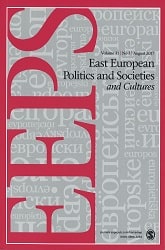Problematic Analogies and Forgotten Details of 1989
Problematic Analogies and Forgotten Details of 1989
Author(s): Daniel ChirotSubject(s): Civil Society, Political history, Government/Political systems, Post-War period (1950 - 1989), Transformation Period (1990 - 2010), Post-Communist Transformation, Sociology of Politics
Published by: SAGE Publications Ltd
Keywords: Gorbachev; Reagan; civil society; Enlightenment;
Summary/Abstract: We are happy that communism ended mostly peacefully in East-Central Europe in 1989. That civil society channeled peaceful dissent in the northern part of this region was important. Nevertheless, it is wrong to minimize other factors. The action of the main leaders of the Soviet Union and the United States were equally or more crucial. Gorbachev’s unwillingness to sustain old Soviet interventionist policies and Reagan’s decision to treat Gorbachev with respect and agree to weapons reductions against the advice of many of his most hawkish advisors were necessary for this to come out well. But unfortunately, because the role of civil society was blown out of proportion, and also because the transition from communism went relatively smoothly, mistaken conclusions were drawn by American policy makers. They came to believe that civil society everywhere in the world was inclined to be democratic, peaceful, and pro-American. In fact, that has not been the case, and the kind of easy transition to free market democracy that marked much of East-Central Europe has not been replicated elsewhere, particularly not in the Middle East and Afghanistan. It might have been more appropriate to conclude from the events of 1989 that Yugoslavia, not Poland, was the case that most resembled the ethnically and religiously divided parts of the world, and to remember that even in Poland the homogeneity of the population was the result of brutal genocide, mass expulsions, and forced boundary changes that had taken place as a result of World War II.
Journal: East European Politics and Societies
- Issue Year: 28/2014
- Issue No: 04
- Page Range: 657-663
- Page Count: 7
- Language: English
- Content File-PDF

